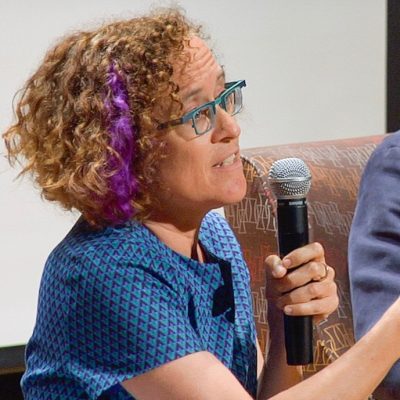Research
Tamara Levitz is a musicologist from Montréal, Canada who currently holds a position as Professor of Musicology at UCLA in Los Angeles, California. She has published widely on musical modernism in Germany, Cuba, Senegal, and France in the 1920s and 30s. Combining extensive archival research with acute critical interpretation, Tamara explores in her work the artistic intentions, complex motivations, sexual and gender identifications, and intricate social relations of musicians, composers, critics, ethnographers, performers, and audiences involved in historical events of musical performance.
Much of her work has focused on renowned artists, including Ferruccio Busoni, John Cage, Igor Stravinsky, and André Gide. She recently completed the monograph Modernist Mysteries: Perséphone (Oxford, 2012), in which she presents a microhistorical analysis of the premiere by Ida Rubinstein of André Gide’s and Igor Stravinsky’s melodrama Perséphone on 30 April 1934.
Tamara Levitz is currently the scholar in residence for the Bard Festival on “Stravinsky and His World,” and is editing a volume of the same name to be published by Princeton University Press to coincide with the festival in August 2013.
BOOKS
• Stravinsky and His World, ed. Tamara Levitz (Princeton: Princeton University Press, 2013).
• Modernist Mysteries: Perséphone (New York: Oxford University Press, 2012).
• Teaching New Classicality: Ferruccio Busoni’s Master Class in Composition. Bern: Peter Lang, 1996.
Publications
Articles
• “Igor the Angelino: The Mexican Connection,” in Stravinsky and His World, ed. Tamara Levitz (Princeton: Princeton University Press, forthcoming 2013).
• “Experimental Music and Revolution: Cuba’s Grupo de Experimentación Sonora del ICAIC,” in Tomorrow is the Question, ed. Ben Piekut (Ann Arbor: University of Michigan Press, forthcoming 2013)
• “Musicology beyond Borders?” position paper for a colloquy I organized with Eric Drott, Brigid Cohen, Victoria Eli Rodríguez, Ryan Dohoney, Emma Dillon, and Matthew D. Morrison for the Journal of the American Musicological Society, forthcoming 2012.
• “The Aestheticization of Ethnicity: Imagining the Dogon at the Musée du quai Branly,” The Music Quarterly, special issue on “Music and Identity,” eds. Annegret Fauser and Tamara Levitz, vol. 89, no. 4 (Winter 2006): 600-42.
• “Syvilla Fort’s Africanist Modernism and John Cage’s Gestic Music: The Story of Bacchanale,” South Atlantic Quarterly 104, no. 1, issue on “Music, Image, Gesture,” ed. Bryan Gilliam (January 2005): 123-50.
• “Yoko Ono and the Unfinished Music of ‘John&Yoko’: Imagining Gender and Racial Equality in the Late 1960s,” in Impossible to Hold: Women, Culture and the Sixties, eds. Lauri Umansky and Avital Bloch (New York: New York University Press, 2004),217-40.
• “The Chosen One’s Choice,” in Beyond Structural Listening: Postmodern Modes of Hearing, ed. Andrew Dell’Antonio (Berkeley: University of California Press, 2004), 70-108.


